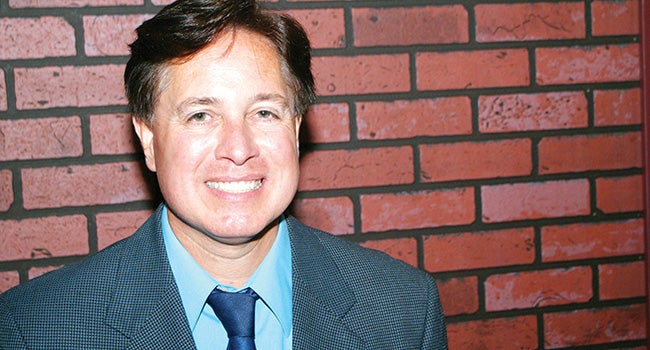SMC history professor publishes book
Published 11:09 am Thursday, June 8, 2017

- Author Jeff Dennis poses against a wall. (Submitted photo)
Add author to Dr. Jeff Dennis’s accomplishments.
The University of South Carolina Press in Columbia just published Patriots and Indians, the first book by the professor of history at Southwestern Michigan College in his hometown, Dowagiac.
Matt Maniscalco, who attended SMC from 2003-2005 and is now a Chicago art director, created the jacket illustration.
Dennis, who dedicates the book about Indians influencing the founding fathers to his wife, Tasha, and daughter, Chloe, earned bachelor’s and master’s degrees from Andrews University in Berrien Springs.
He subsequently taught social studies, chemistry and mathematics at Spring Valley Academy in Ohio.
Dennis received his Ph.D. in American history from the University of Notre Dame in 2003.
From 2001-2008, when he joined SMC, he served as a teacher educator and assistant professor of history at Morehead State University in Kentucky and at Kennesaw State University in Georgia.
“In this meticulously researched volume, Jeff Dennis focuses on the Cherokee and South Carolinians to explore the complex relations between Indians and colonists in the Revolutionary era,” according to author James Piecuch. “Dennis provides a valuable new perspective on America’s founders, identifying a clear link between Revolutionary radicalism and animosity toward Indians that shaped national policy long after the Revolution.”
Dennis “tells a story often told, but from a new angle,” according to Thomas Lynwood Powers, University of South Carolina Sumter professor of history emeritus, “this time including American Indians, not as extras or sidekicks, but as leading actors in the drama.”
“Deep and careful research establishes beyond doubt that for the Revolutionary generation in South Carolina, Native Americans mattered,” University of Michigan Professor Gregory Dowd stated.
Dennis sees two Americas in the Revolutionary period leading to 1776 independence.
“I see a noble war for freedom from Great Britain,” Dennis says. “I also see a war on the frontier that’s not so noble because of brutal treatment of Native Americans in the quest for land.
“To understand this period, one dimension to focus upon is their relationships with Native Americans, who were prominent throughout the 13 colonies. They influenced the lives and careers of many founding fathers.
“South Carolina’s role in the revolution has been underestimated. There’s no Yorktown (in Virginia) if there aren’t first engagements in the Carolinas.”
“The American Revolution was substantially radical,” Dennis said. “We think of it as tame next to the French Revolution. It didn’t use guillotines, but it had terror, too.”
“Southern men of honor, such as George Washington and Andrew Pickens (militia leader who became a South Carolina congressman), demonstrated that unchecked expansion and the Trail of Tears (1838-39 forced migration of Cherokee Indians from Georgia to Oklahoma; an estimated 4,000 men, women and children died) were by no means inevitable. Had Thomas Jefferson simply prohibited slavery in Louisiana, perhaps the Civil War was not inevitable. We honor Jefferson on Mount Rushmore and with a memorial in Washington. Had he acted with honor, he might have surpassed Washington and Abraham Lincoln.”
The 1803 Louisiana Purchase comprised all or part of 15 U.S. states and two Canadian provinces. At $236 million in today’s dollars, the vast expanse cost less than 42 cents an acre.
“When we tell the story of our nation, it’s easy to leave some things out and to shape the story in such a way it’s pleasing to us. There are patriotic historians who see the best of us in the American Revolution story. Sometimes they don’t talk about darker elements. There are revisionists who want to point out shortcomings, overlooking uplifting, positive elements of who we are. We need to know the full, wider story of perspectives which shaped our nation.”
Though “incredibly gifted,” Jefferson “is a very difficult character to read.”
Dubbed “The American Sphinx,” the third president was an “enigmatic figure, a political machinator with many deep contradictions. He was the architect of removal policy, using deception to separate eastern nations from their land. ‘We have only to shut our hand to crush them,’ he wrote to William Henry Harrison. ‘Should any tribe be foolhardy enough to take up the hatchet, we’ll conquer that tribe and drive them across the Mississippi.’”
Jefferson “was fascinated as an intellectual by Indians’ oratory and customs. He learned seven languages. He asked Lewis and Clark to collect artifacts he proudly displayed. But when push came to shove, he wanted land. In part, he purchased Louisiana as a place to put Indians. He even floated an unsuccessful Constitutional amendment to remove Indians from the east. In an agricultural society, land established genteel status.”
“More than anything,” Dennis said, “the struggle over land separated American elite from Indians and Britons during the 12-year period before the Revolution. Land is a sacred resource to Native peoples. The notion of land ownership is arrogant.”
Southwestern Michigan College is a public, residential and commuter, community college, founded in 1964. The college averages in the top 10 percent nationally for student academic success based upon the National Community College Benchmark Project. Southwestern Michigan College strives to be the college of first choice, to provide the programs and services to meet the needs of students, and to serve our community. The college is accredited by The Higher Learning Commission of the North Central Association of Colleges and Schools and is a member of the American Association of Community Colleges.






